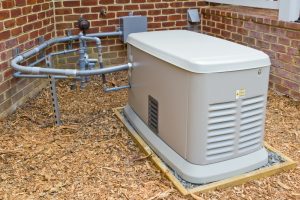
If you live in an area that frequently experiences strong storms and possible power outages, it’s a good idea to have a whole-house generator for backup in case the lights go out for an extended period of time. What you do not want, though, is to go turn on that generator and find out that it’s not running right (or won’t start at all). That’s why, just like everything else in your house, your whole-house generator needs maintenance and upkeep on a regular basis.
Oil Change
Chances are, you wouldn’t put 10,000 miles on your car without an oil change, and the same goes for your generator. It is, after all, an internal combustion engine and is prone to the same carbon, acids, water vapor and other contaminants that end up in the motor oil of any engine.
Usually, owner’s manuals and specs for whole-house generators call for an oil change after about 200 hours of use, but you’ll want to check your manufacturer’s recommendations for your unit. Most generator engines have a two-quart crankcase capacity, and you’ll want to replace the dirty, contaminated oil filter at the same time just like with your car. If the generator has been running for an extended time, be sure to allow a thorough cool-down before changing the oil.
Just like with a car engine, synthetic motor oil is a superior alternative to conventional oil. It performs better at extremely low or high temperatures without a change in its viscosity, and can be used for a longer interval of time between changes.
Spark Plug
On a stationary engine like a whole-house generator unit, the spark plug can get pretty nasty and carboned-up after a year of service. When you perform maintenance, it’s a good idea to at least take the plug out and inspect it. If it’s worn or dirty, go ahead and replace it – make sure you’ve selected the right replacement spark plug and set it to the correct gap.
Your last step should be to replace the air filter, which can impair performance and ease of starting if left too long.
Call a Professional
We’ve covered pretty much everything that a homeowner can safely perform on a whole-house generator.
Bearing in mind that the generator is hooked into the house’s electrical system, there are other tests that should be performed by an electrician or an HVAC tech who’s qualified for that type of work. That includes:
- Testing the unit’s load
- Testing the batteries and ensuring they have a full charge
- Inspecting and cleaning all connections and wiring, and checking the wiring that runs from generator to house
- Verifying any readings on the control panel and making sure they’re within normal operating range
- Inspecting the entire unit and replacing any parts that are worn or in danger of imminent failure
You know you’re going to need that whole-house generator sooner or later when the lights go out, so make sure it’s ready.
Call Professional Heating & Air for generator repair in Covington, LA today!
